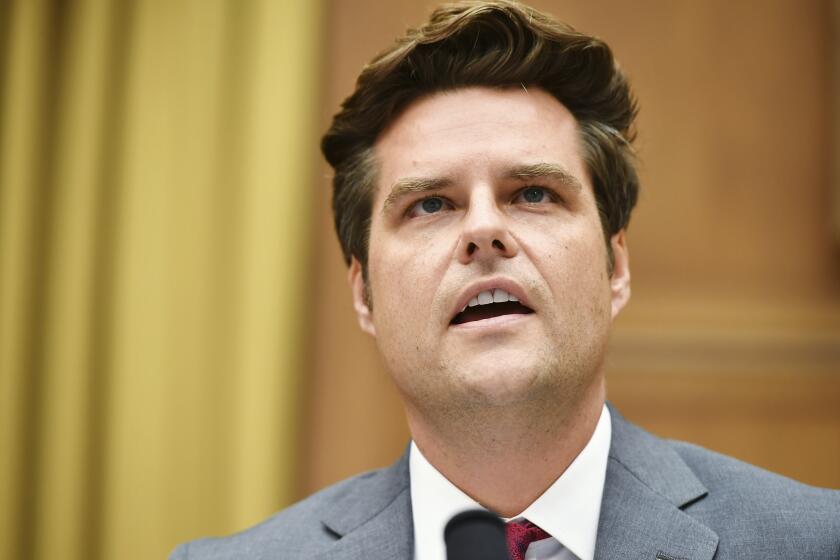Not just Verizon? Secret NSA effort to gather phone data is years old
WASHINGTON -- The massive National Security Agency collection of telephone records disclosed Wednesday was part of a continuing program that has been in effect nonstop since 2006, according to the two top leaders of the Senate Intelligence Committee.
“As far as I know, this is the exact three-month renewal of what has been in place for the past seven years,” Sen. Dianne Feinstein (D-Calif.) told reporters Thursday. The surveillance “is lawful” and Congress has been fully briefed on the practice, she added.
Her Republican counterpart, Saxby Chambliss, concurred: “This is nothing new. This has been going on for seven years,” he said. “Every member of the United States Senate has been advised of this. To my knowledge there has not been any citizen who has registered a complaint. It has proved meritorious because we have collected significant information on bad guys, but only on bad guys, over the years.”
The statements by the two senators, whose committee positions give them wide access to classified data, appeared to rule out the possibility that the court order directing Verizon to turn over telephone records was related to the Boston Marathon bombings. The order was effective as of April 19, shortly after the bombings, which had sparked speculation about a link.
Instead, the surveillance, which was revealed Wednesday by Britain’s Guardian newspaper, appears to have been of far longer duration. Although the senators did not specify the scope of the surveillance, the fact that it has been in place since 2006 also suggests that it is not limited to any one phone carrier.
The Obama administration defended the program Thursday, saying the data collection “has been a critical tool in protecting the nation from terrorist threats to the United States.”
A senior administration official released a statement which did not confirm the existence of the court order authorizing the surveillance, which, according to the copy released by the Guardian, is marked “Top Secret.” It was issued in late April by the Foreign Intelligence Surveillance Court, a secret court that meets in Washington, and allowed the government to collect the bulk data until July 19.
“The information acquired does not include the content of any communications or the name of any subscriber,” the official said. “It relates exclusively to metadata, such as a telephone number or the length of a call.
The court order was authorized under a provision of the Foreign Intelligence Surveillance Act that allows the government to collect business records in bulk if its requests are approved by the court.
The official said telephone data allow “counterterrorism personnel to discover whether known or suspected terrorists have been in contact with other persons who may be engaged in terrorist activities, particularly people located inside the United States.”
The official requested anonymity to discuss the counterterrorism program.
In defending the data collection program, the administration official sought to spread responsibility, noting that “all three branches” of government were tasked with review and oversight of surveillance.
“There is a robust legal regime in place governing all activities conducted pursuant to the Foreign Intelligence Surveillance Act,” the official said. He said that involves oversight by the Department of Justice, the Office of the Director of National Intelligence and the FISA court.
Separately, the Justice Department released a letter defending the administration’s handling of the FISA law that they had sent in 2011 to two senators who had objected to it.
“We do not believe the Executive Branch is operating pursuant to ‘secret law’ or ‘secret opinions of the Department of Justice,’ “ said the letter, signed by Assistant Atty. Gen. Ronald Weich. The “Intelligence Community is conducting court-authorized intelligence activities pursuant to a public statute, with the knowledge and oversight of Congress and the Intelligence Communities of both Houses.”
“Many other collection activities are classified,” Weich added, saying that “this is necessary because public disclosure of the activities they discuss would harm national security and impede the effectiveness of the intelligence tools that Congress has approved.”
Weich further defended the program by saying intelligence officials have “determined that public disclosure of the classified use” of the law “would expose sensitive sources and methods to our adversaries and therefore harm national security.”
He said collection of records, as now underway with Verizon phone logs, was different than material obtained through grand jury subpoenas. Grand jury subpoenas, he said, can be obtained by prosecutors without court approval. In contrast, he said, the intelligence collections can be done only with approval from a federal judge sitting on the Foreign Intelligence Surveillance Court.
Most importantly, he noted that FISA courts require a showing by officials that the records sought “are relevant to an authorized national security investigation.”
The Weich letter was sent to Sen. Ron Wyden (D-0re.).
Atty. Gen. Eric H. Holder Jr. is testifying Thursday morning before the Senate Appropriations Committee, and is expected to address the matter further.
Follow Politics Now on Twitter and Facebook
kathleen.hennessey@latimes.com
Twitter: @khennessey
More to Read
Get the L.A. Times Politics newsletter
Deeply reported insights into legislation, politics and policy from Sacramento, Washington and beyond. In your inbox three times per week.
You may occasionally receive promotional content from the Los Angeles Times.












